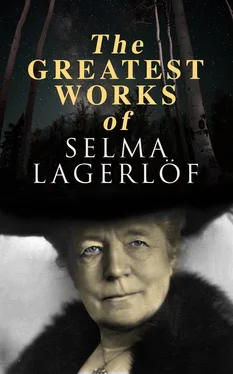There was much to tell, first and foremost, about all the children which she had brought up. They had been in the cowshed every day, and in the summer they had taken the cattle to pasture on the swamp and in the groves, so the old cow knew all about them. They had been splendid, all of them, and happy and industrious. A cow knew well enough what her caretakers were good for.
There was also much to be said about the farm. It had not always been as poor as it was now. It was very large—although the greater part of it consisted of swamps and stony groves. There was not much room for fields, but there was plenty of good fodder everywhere. At one time there had been a cow for every stall in the cowshed; and the oxshed, which was now empty, had at one time been filled with oxen. And then there was life and gayety, both in cabin and cowhouse. When the mistress opened the cowshed door she would hum and sing, and all the cows lowed with gladness when they heard her coming.
But the good man had died when the children were so small that they could not be of any assistance, and the mistress had to take charge of the farm, and all the work and responsibility. She had been as strong as a man, and had both ploughed and reaped. In the evenings, when she came into the cowshed to milk, sometimes she was so tired that she wept. Then she dashed away her tears, and was cheerful again. "It doesn't matter. Good times are coming again for me too, if only my children grow up. Yes, if they only grow up."
But as soon as the children were grown, a strange longing came over them. They didn't want to stay at home, but went away to a strange country. Their mother never got any help from them. A couple of her children were married before they went away, and they had left their children behind, in the old home. And now these children followed the mistress in the cowshed, just as her own had done. They tended the cows, and were fine, good folk. And, in the evenings, when the mistress was so tired out that she could fall asleep in the middle of the milking, she would rouse herself again to renewed courage by thinking of them. "Good times are coming for me, too," said she—and shook off sleep—"when once they are grown."
But when these children grew up, they went away to their parents in the strange land. No one came back—no one stayed at home—the old mistress was left alone on the farm.
Probably she had never asked them to remain with her. "Think you, Rödlinna, that I would ask them to stay here with me, when they can go out in the world and have things comfortable?" she would say as she stood in the stall with the old cow. "Here in Småland they have only poverty to look forward to."
But when the last grandchild was gone, it was all up with the mistress. All at once she became bent and gray, and tottered as she walked; as if she no longer had the strength to move about. She stopped working. She did not care to look after the farm, but let everything go to rack and ruin. She didn't repair the houses; and she sold both the cows and the oxen. The only one that she kept was the old cow who now talked with Thumbietot. Her she let live because all the children had tended her.
She could have taken maids and farm-hands into her service, who would have helped her with the work, but she couldn't bear to see strangers around her, since her own had deserted her. Perhaps she was better satisfied to let the farm go to ruin, since none of her children were coming back to take it after she was gone. She did not mind that she herself became poor, because she didn't value that which was only hers. But she was troubled lest the children should find out how hard she had it. "If only the children do not hear of this! If only the children do not hear of this!" she sighed as she tottered through the cowhouse.
The children wrote constantly, and begged her to come out to them; but this she did not wish. She didn't want to see the land that had taken them from her. She was angry with it. "It's foolish of me, perhaps, that I do not like that land which has been so good for them," said she. "But I don't want to see it."
She never thought of anything but the children, and of this—that they must needs have gone. When summer came, she led the cow out to graze in the big swamp. All day she would sit on the edge of the swamp, her hands in her lap; and on the way home she would say: "You see, Rödlinna, if there had been large, rich fields here, in place of these barren swamps, then there would have been no need for them to leave."
She could become furious with the swamp which spread out so big, and did no good. She could sit and talk about how it was the swamp's fault that the children had left her.
This last evening she had been more trembly and feeble than ever before. She could not even do the milking. She had leaned against the manger and talked about two strangers who had been to see her, and had asked if they might buy the swamp. They wanted to drain it, and sow and raise grain on it. This had made her both anxious and glad. "Do you hear, Rödlinna," she had said, "do you hear they said that grain can grow on the swamp? Now I shall write to the children to come home. Now they'll not have to stay away any longer; for now they can get their bread here at home." It was this that she had gone into the cabin to do—
The boy heard no more of what the old cow said. He had opened the cowhouse door and gone across the yard, and in to the dead whom he had but lately been so afraid of.
It was not so poor in the cabin as he had expected. It was well supplied with the sort of things one generally finds among those who have relatives in America. In a corner there was an American rocking chair; on the table before the window lay a brocaded plush cover; there was a pretty spread on the bed; on the walls, in carved-wood frames, hung the photographs of the children and grandchildren who had gone away; on the bureau stood high vases and a couple of candlesticks, with thick, spiral candles in them.
The boy searched for a matchbox and lighted these candles, not because he needed more light than he already had; but because he thought that this was one way to honour the dead.
Then he went up to her, closed her eyes, folded her hands across her breast, and stroked back the thin gray hair from her face.
He thought no more about being afraid of her. He was so deeply grieved because she had been forced to live out her old age in loneliness and longing. He, at least, would watch over her dead body this night.
He hunted up the psalm book, and seated himself to read a couple of psalms in an undertone. But in the middle of the reading he paused—because he had begun to think about his mother and father.
Think, that parents can long so for their children! This he had never known. Think, that life can be as though it was over for them when the children are away! Think, if those at home longed for him in the same way that this old peasant woman had longed!
This thought made him happy, but he dared not believe in it. He had not been such a one that anybody could long for him.
But what he had not been, perhaps he could become.
Round about him he saw the portraits of those who were away. They were big, strong men and women with earnest faces. There were brides in long veils, and gentlemen in fine clothes; and there were children with waved hair and pretty white dresses. And he thought that they all stared blindly into vacancy—and did not want to see.
"Poor you!" said the boy to the portraits. "Your mother is dead. You cannot make reparation now, because you went away from her. But my mother is living!"
Here he paused, and nodded and smiled to himself. "My mother is living," said he. "Both father and mother are living."
Table of Contents
Читать дальше












